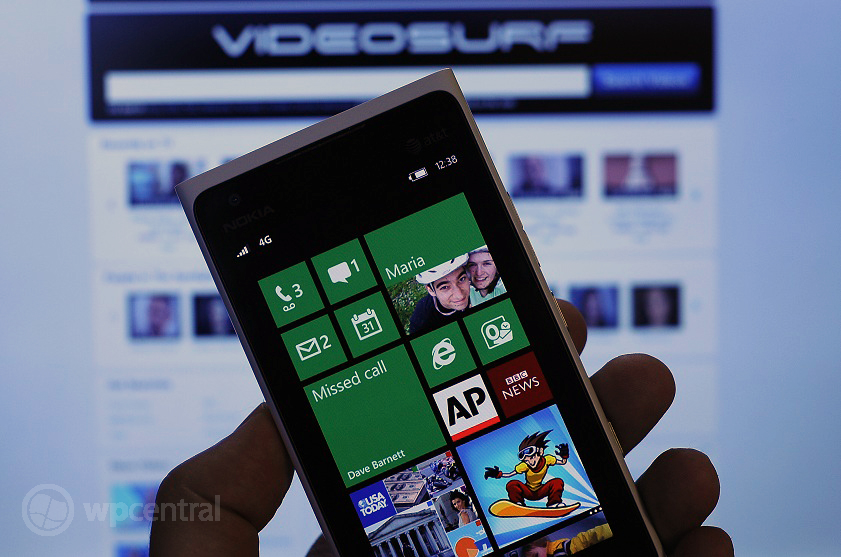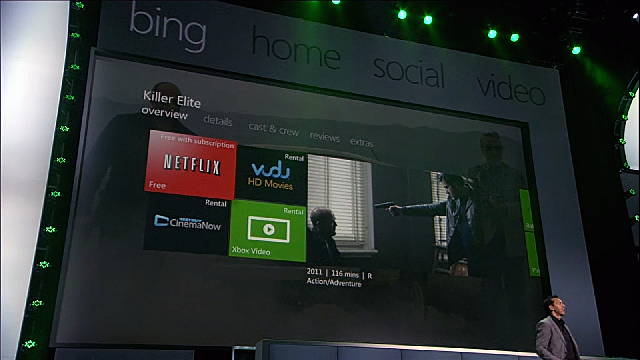Microsoft, VideoSurf and the Windows Phone 8 connection to Bing

Is VideoSurf's technology used in Windows Phone 8?
With today’s leak of supposed Windows Phone 7.8 features (that list is reportedly not complete either) perhaps the most interesting aspect was the new Windows Phone 8 feature with TV support via Bing Audio.
We speculated that this was an IntoNow-like service whereby you can ID television shows by letting your phone sample audio from whatever you are watching. This is analogous to the Bing Audio music ID feature introduced in Windows Phone 7.5 Mango. The question is how would Microsoft do this? Did they just invent their own video-audio ID service?
The answer may be found with an acquisition by Microsoft late last year of a company called VideoSurf (www.videosurf.com; press release).
VideoSurf allows you to search for videos but across services like YouTube, Hulu, CNN, TMZ, Dailymotion, Comedy Central and more. It’s a tremendously powerful search service that is actually legitimate i.e. not one looking to infringe on copyrighted work.
Developed in 2006 by some Israeli entrepreneurs, the company raised $28 million dollars from numerous investors before being acquired by Microsoft on November 22nd, 2011 for a reported $100 million dollars.
VideoSurf's technology integrated into the Xbox 360 at E3 2012
All the latest news, reviews, and guides for Windows and Xbox diehards.
So how will VideoSurf be used by Microsoft? Like Skype, VideoSurf’s technology will be incorporated into existing service layers at Microsoft. Some of this was demonstrated at E3 when during the presentation (~29 min marker) it was shown how you can search for a movie on the Xbox 360 and it would display results from Hulu, Netflix or Amazon Video, allowing the user to select which service they preferred (or had a membership for).
What really piqued our interest though was this bit of information from TechCrunch who wrote about the acquisition last year:
“Not only that, but VideoSurf also implements some cool audio recognition technology along with facial recognition functionality that allows the startup to pull from specific frames within videos, which, when combined, the company (and Microsoft clearly agrees) can provide better search results (and relevancy) coupled with an enhanced user experience. “
And that’s our 'gotcha' moment. Microsoft integrating video recognition via audio samples was already accomplished by VideoSurf, a company which they’ve owned since last year. So the idea that Windows Phone 8 will be using the technology (in addition to the Xbox 360 and Windows 8, the web, etc.) is extremely likely and corroborates the WP7Forum.ru information from earlier today.
Assuming it's true, exactly how it will work on Windows Phone will be the interesting part. Since VideoSurf can evidently ID video frames via facial ID, perhaps we will use the phone’s camera to sample a clip from the TV (coupled with audio) which will bring near-instant search results. That’s a tantalizing service that as far as we know even Google can’t match (though they do have Google Goggles which could be extended).
Surely we’ll find out more about this feature in the coming weeks but if you were wondering what the connection between Bing Audio with TV was you can now know it is Microsoft’s VideoSurf. Thanks, clubdirthill, for the heads up.
Update: If you are curious how the data could be used, we know that Windows Phone 8 will allow apps to "talk to each other" meaning the data could be passed off to any 3rd party application or service. In addition, things like buying the show on DVD, adding it to your Netflix queue, sharing with your social networks, recommending it others on Bing or working with Microsoft's SmartGlass are just a few potential uses. Can you think of others?

Daniel Rubino is the Editor-in-Chief of Windows Central. He is also the head reviewer, podcast co-host, and lead analyst. He has been covering Microsoft since 2007, when this site was called WMExperts (and later Windows Phone Central). His interests include Windows, laptops, next-gen computing, and wearable tech. He has reviewed laptops for over 10 years and is particularly fond of Qualcomm processors, new form factors, and thin-and-light PCs. Before all this tech stuff, he worked on a Ph.D. in linguistics studying brain and syntax, performed polysomnographs in NYC, and was a motion-picture operator for 17 years.

